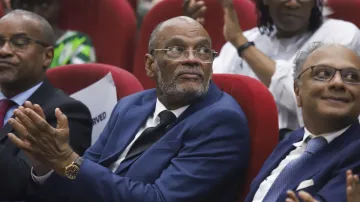Haiti PM Ariel Henry resigns, paves way for transitional government amid widespread gang violence
Henry had announced his resignation last month after intense pressure and chaos as armed gangs launched attacks in Port-au-Prince in late February. Henry has been considered by many as corrupt and gangs had blamed him for deepening poverty in Haiti.

Port-au-Prince: Haiti Prime Minister Ariel Henry has officially stepped down, according to his office, paving the way for a transitional council to lead the country that aims to bring back peace and tranquility to the country amid widespread gang violence. Henry's finance minister, Patrick Boisvert, will lead as interim prime minister, according to the nation's official gazette.
In a letter dated Wednesday but uploaded to social media on Thursday, Henry said his administration had "served the nation in difficult times." His government formalised a transition process two weeks ago, a month after Henry announced his resignation while stranded outside the country as alliances of heavily armed gangs threatened to completely take over the capital.
Gang violence, which has worsened for years, escalated earlier this year. More than 2,500 people were killed or injured from January through March, up 53% from the last three months of 2023, recent data from the the United Nations Integrated Office in Haiti (BINUH) shows.
Haiti PM announced resignation in March
Henry officially announced his resignation early last month amid pressure and chaos in the Caribbean nation. He became the Prime Minister in 2021 following the assassination of the country's last president, Jovenel Moise. Henry is set to be replaced by a presidential council that will have two observers and seven voting members, including representatives from a number of political coalitions, the business sector, civil society and one religious leader.
The nine-member council, of which seven have voting powers, is also expected to help set the agenda of a new Cabinet. It will also appoint a provisional electoral commission, a requirement before elections can take place, and establish a national security council. The council's non-renewable mandate expires on February 7, 2026, at which date a new president is scheduled to be sworn in.
Henry's resignation comes alongside regional talks over participation in an international force, which he had requested to help police fight the gangs, whose brutal turf wars have fueled a humanitarian crisis, cut off food supplies and forced hundreds of thousands from their homes. Gangs have long opposed Henry and sought to oust him, blaming him for the deepening poverty in the country.
Dramatic violence in Haiti
Gangs launched coordinated attacks on February 29, when Henry was on an official visit to Kenya to push for a UN-backed deployment of a police force, in the capital, Port-au-Prince, and surrounding areas. They burned police stations and hospitals, opened fire on the main international airport that has remained closed since early March and stormed Haiti's two biggest prisons, releasing more than 4,000 inmates. Gang leader Cherizier threatened to go after hotel owners hiding politicians or collaborating with Henry.
The international community has urged the council to prioritise Haiti's widespread insecurity. Even before the attacks began, gangs already controlled 80 per cent of Port-au-Prince. The number of people killed in early 2024 was up by more than 50 per cent compared with the same period last year, according to a recent UN report.
Nearly 100,000 people have fled the capital in search of safer cities and towns since the attacks began. Tens of thousands of others left homeless after gangs torched their homes are now living in crowded, makeshift shelters in the capital. “It is impossible to overstate the increase in gang activity across Port-au-Prince and beyond, the deterioration of the human rights situation and the deepening of the humanitarian crisis,” María Isabel Salvador, the UN special envoy for Haiti, said at a UN Security Council meeting on Monday.
India launched rescue operation
The Indian government launched "Operation Indravati" to evacuate its nationals from the violence-hit country. Minister of External Affairs, Dr S Jaishankar took to social media and said 12 Indian nationals were evacuated from the Caribbean country on March 21. The evacuees were shifted to the neighbouring Dominican Republic.
"India begins Operation Indravati to evacuate its nationals from Haiti to the Dominican Republic. 12 Indians evacuated today," he wrote on X. Further, he ensured the countrymen that the government would take care of its nationals in other nations in case of any untoward situation or emergency. "Fully committed to the security and well-being of our nationals abroad. Thank the Government of the Dominican Republic for their support," he added.
Under international pressure and stranded in Puerto Rico, the unelected Henry announced his resignation pending the appointment of a council and temporary replacement, but the transition council was delayed amid disagreements by some of the groups putting forward representatives. Gangs have warned of a "battle" for Haiti and threatened politicians who join the transition council.
Haiti has lacked elected representatives since early 2023 and its next elections will be the first since 2016. Henry, who many Haitians consider corrupt, had repeatedly postponed elections, saying security must first be restored. Regional leaders met on Monday in nearby Jamaica to discuss the framework for a political transition, which the US had urged last week to be "expedited" as armed gangs sought to topple his government.
(with inputs from agencies)
ALSO READ | Operation Indravati: India launches evacuation of its nationals from violence-hit Haiti, 12 evacuated today